Potassium is a mineral and electrolyte that’s essential for proper muscle function. Potassium supplements are particularly popular for people on ketogenic diets, because spending long periods of time in ketosis can cause your potassium levels to drop.
There are also a host of side effects of the ketogenic diet that might be able to be mitigated by a potassium supplement.
Looking for an easy way to sustain your potassium intake on a restrictive diet? We’ve got you covered. Our researchers have ranked the ten best potassium supplements on the market.
Research
Rankings
1. Solimo Potassium
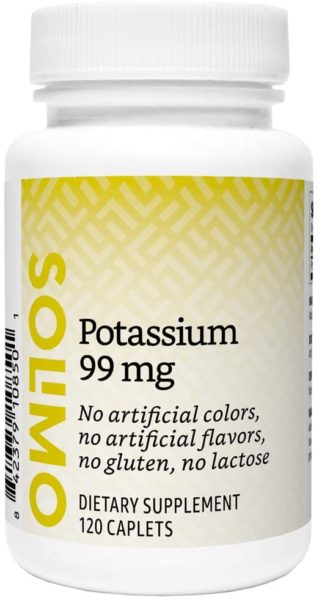
Solimo, Amazon’s foray into supplement manufacturing, has a pretty basic potassium supplement that’s delivered in the highly soluble gluconate form.
It’s a standard-dose, easily-absorbed form of potassium that’s a good bet if all you need is the basics. If just potassium is what you want, this should be your top pick.
2. Keto Vitals Electrolyte Capsules
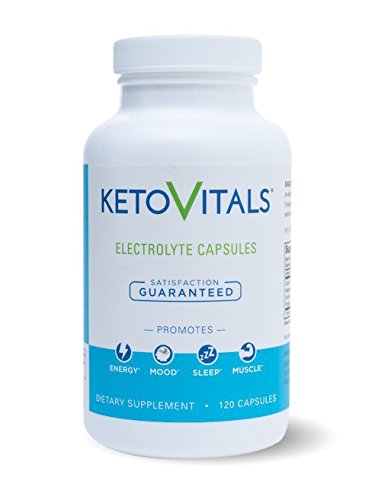
With calcium, magnesium, sodium, and potassium, Keto Vitals Electrolyte Capsules are the best choice if you want to take care of all of your electrolytes in one fell swoop.
Since many people on ketogenic diets feel that they are electrolyte deficient, combining these main electrolytes into one supplement seems like a smart idea.
With a super-clean capsule design, it’s an excellent and very pure choice for an all in one electrolyte solution.
3. Code Age Keto Electrolytes
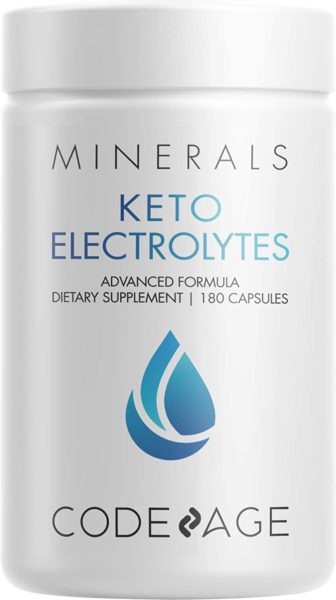
Code Age Keto Electrolytes provides a comprehensive electrolyte supplement designed specifically for the needs of keto dieters.
It has a high dose of magnesium and sodium as well as the standard 100 mg of potassium, so you won’t be lacking any of the key electrolytes your body needs.
This supplement might help combat what some people call the “keto flu,” a listless feeling of fatigue that some keto dieters attribute to a lack of electrolytes.
4. Pure Encapsulations Potassium Citrate
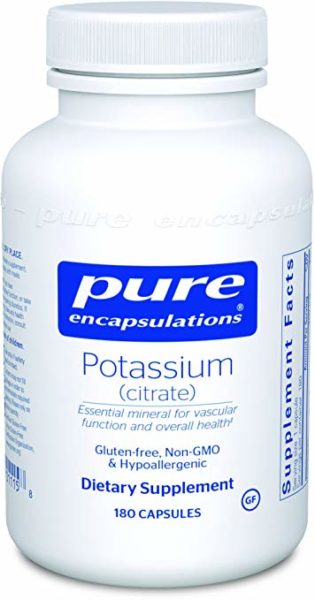
Pure Encapsulations Potassium Citrate delivers a pretty straightforward potassium supplement, albeit with a slightly less common form of potassium.
It’d be a good call if potassium gluconate supplements are upsetting your stomach, or if you don’t feel like you are getting the optimal benefit from other potassium supplements.
5. Thorne Research Potassium Citrate
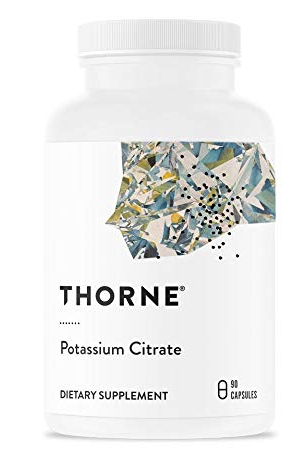
Thorne Research Potassium Citrate is a pretty straightforward citrate-based potassium supplement. It delivers the usual 99 mg dosage, though the list of additives is a little longer than you might like.
If you are particular about clean supplement design and purity, this isn’t the best option, but it does get the job done.
6. Zenesis Labs Potassium with Iodine
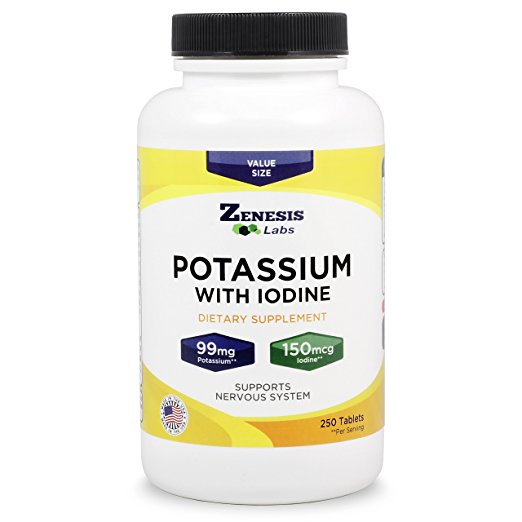
Zenesis Labs delivers potassium alongside iodine, which is a nutrient you may be low in if you are restricting your daily sodium intake.
It’s a good combo if you are taking potassium to reduce leg cramps and muscle spasms, as some people find the addition of iodine helpful. For keto dieters, though, the iodine may not be necessary.
7. Zea Salt
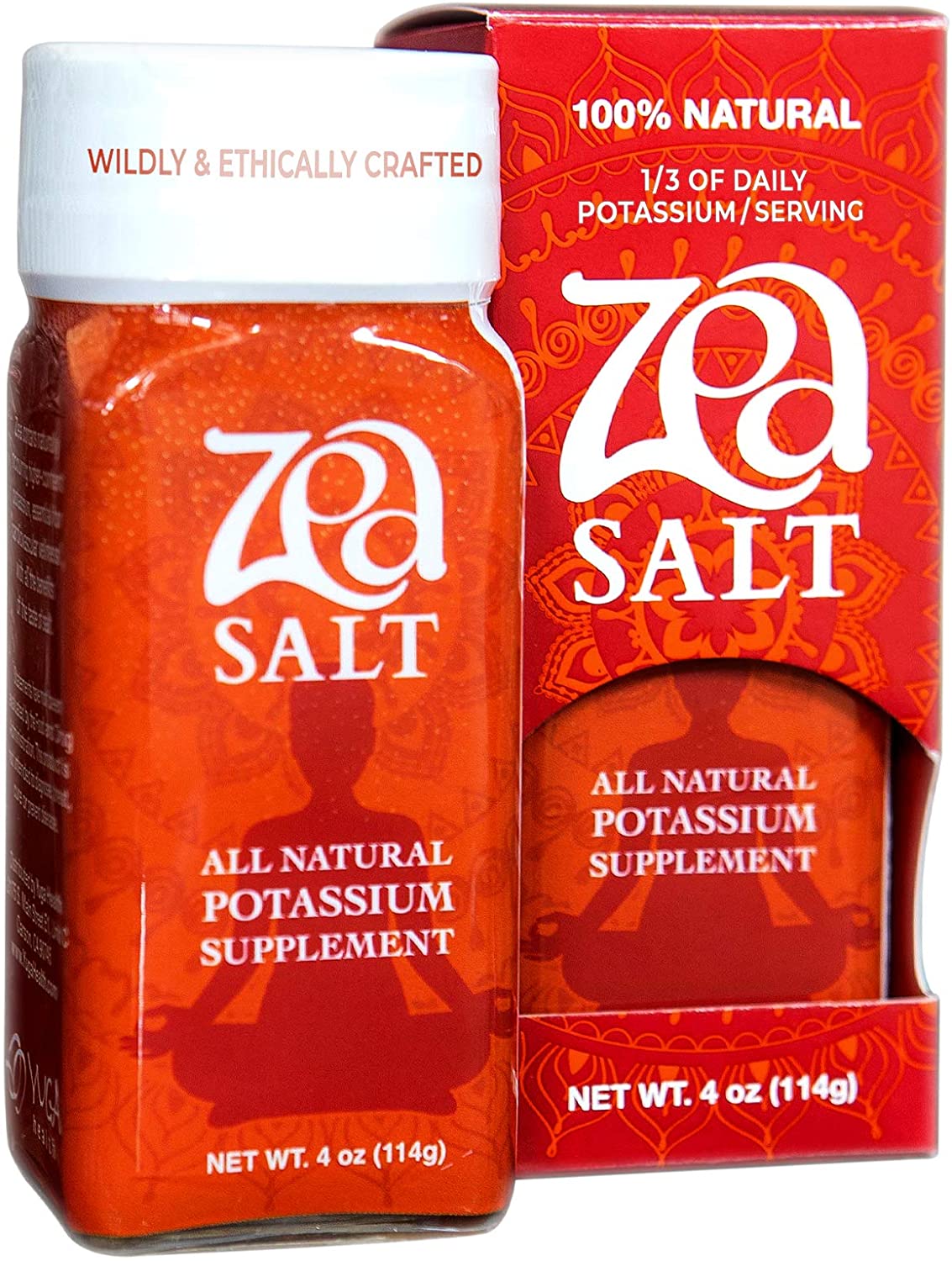
Most salt replacements use synthetic potassium chloride and lots of anti-caking agents—not Zea Salt. This low-sodium salt replacement uses an extract from red algae that’s high in potassium to deliver an all-natural potassium-based supplement you can use instead of table salt, and for this niche use, it’s a solid pick.
8. Hi Lyte Advanced Electrolyte Salt Caps
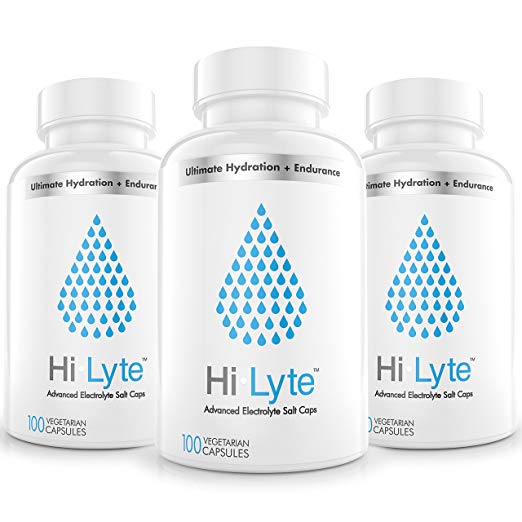
Hi Lyte Advanced Electrolyte Salt Caps take a maximalist approach to electrolytes. These capsules provide the basics, including potassium, sodium, calcium, and magnesium, but also a litany of other nutrients, like manganese, tyrosine, and vitamin B6.
While these won’t be necessarily needed if you are just taking potassium for the keto diet benefits, it may be useful if you are looking for a sports-specific electrolyte supplement that comes in capsule-based form.
9. Solgar Potassium
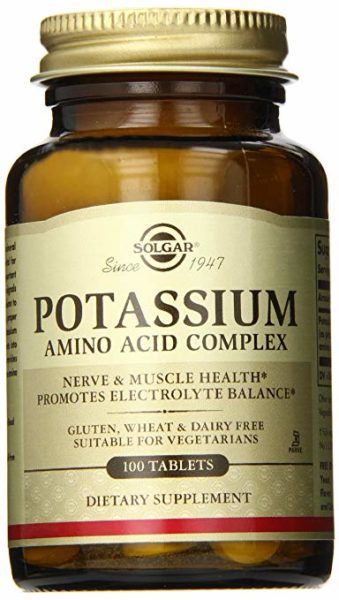
Solgar Potassium uses potassium gluconate and a standard dosage, but the capsules are full of a lot of additives, like silica and dicalcium phosphate, that probably aren’t necessary if all you want is to increase your potassium intake a bit.
Still, it does accomplish what it sets out to do, which is deliver an easily absorbed form of potassium.
10. Nature Made Potassium Gluconate
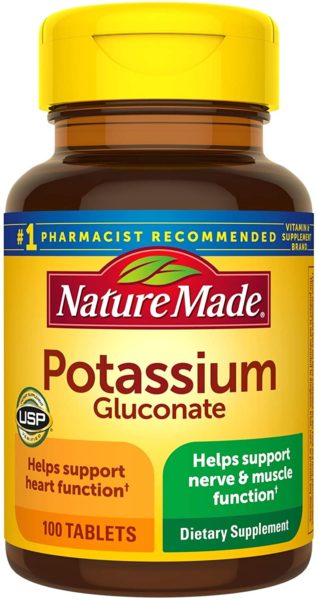
Nature Made Potassium Gluconate has 90 mg of potassium, which is slightly lower than usual. That’s all right if you only need to boost your intake by a small amount, but purists may not like the rather long list of ingredients other than potassium.
Since other supplement makers manage to make potassium supplements without these additives, you might want to opt for something else if clean supplement design is important to you.
Category winners
Best potassium overall: Solimo Potassium
For a simple and pure tablet-based potassium supplement, look no further than Solimo Potassium. It’s our favorite overall thanks to its pure, minimalist formulation, and it should be your first choice if a simple potassium tablet is what you’re looking for.
Best potassium with electrolytes: Keto Vitals Electrolyte Capsules
To get potassium alongside other critical electrolytes, Keto Vitals Electrolyte Capsules is a great pick. It features potassium plus sodium, calcium, and multiple forms of magnesium, making it a solid all-around pick for keeping healthy electrolyte levels/
Best potassium for salt replacement: Zea Salt
Trying to keep your table salt intake low? Zea Salt uses potassium derived from red algae as a salt substitute, delivering a low-sodium, all-natural, potassium-based salt replacement.
Best iodized potassium: Zenesis Labs Potassium with Iodine
If you’re using potassium to replace sodium (for example, by decreasing your table salt usage), one issue you could have is a decrease in your iodine levels. Zenesis addresses this by pairing 150 mcg of iodine with the 99 mg of potassium in each tablet.
Best potassium for leg cramps: Code Age Keto Electrolytes
A multi-ingredient electrolyte supplement is one of the first things many people try for leg cramps, and Keto Vitals is our favorite on this front thanks to its inclusion of potassium alongside a rapidly-absorbed form of magnesium, both of which may play a role in preventing leg cramps.
Best potassium for keto diet: Code Age Keto Electrolytes
Keeping a steady intake of electrolytes is one major component of a successful keto diet, and for this use-case, we recommend Code Age Keto Electrolytes thanks to its inclusion of potassium alongside magnesium and calcium, two other trace minerals that play important roles in regulating your physical and mental performance.
Who Should Buy Potassium?
Potassium is safe for everyone and can be used to help promote proper electrolyte balance, reduce blood pressure and eliminate muscle cramping. It is especially beneficial for athletes and people who exercise regularly as they can lose a lot of potassium if they sweat a lot.
Pregnant women and children should be fine to consume potassium supplements, but you should speak to a doctor before.
How We Ranked
The first thing we looked at was the dosage. Nature Made Potassium is an average product that included a low dose of potassium. Its addition of additives led it to rank last on our list. Solgar Potassium had the same issue, including additives like silica and dicalcium phosphate. Hi Lyte Advanced Electrolyte Salt Caps are a much better option, providing a mix of electrolytes. If it had more potassium per serving, we would’ve ranked it higher.
Next, we looked at additional supporting ingredients. Zenesis Labs provides a solid potassium supplement mixed with iodine, which is another nutrient people are commonly deficient in. Thorne Research Potassium Citrate is a solid choice that provides a standard dose of potassium. Unfortunately, it includes a long list of unnecessary ingredients, which is why it didn’t rank higher. Pure Encapsulations Potassium Citrate delivers a potassium supplement that doesn’t cause as much GI distress as the more common potassium gluconate supplements. With minimal fillers and additives, ranking it in our top 5 was a no brainer.
Code Age Keto Electrolytes provides much more than just potassium. It includes a high dose of magnesium and sodium alongside potassium to help combat muscle cramping and electrolyte imbalances. Keto Vitals took second place for providing potent electrolyte support capsules to help combat electrolyte imbalances on a keto diet. It contains no fillers or additives and scientifically backed dosages of magnesium, potassium, and sodium, which is why it ranked so highly.
Lastly, we looked at bioavailability. Solimo took the top spot for providing one of the best pure potassium products on the market. While basic, it comes in the highly bioavailable potassium gluconate form, which also tends to be easier on the stomach and intestines. With no fillers or additives, its no surprise it took the top spot.
Benefits
Potassium supplements might be able to sustain your body better on a ketogenic diet. Keto diets have been studied for a long time, since they were initially developed to treat intractable epilepsy in children.
Thus, the potential adverse effects of remaining in ketosis for long periods of time have been studied in detail. A scientific report published by doctors at Montefiore Medical Center and the Albert Einstein College of Medicine in New York in 1998 detailed some of these complications, which can include low or dysregulated potassium levels (1).
Interestingly, the doctors in this study often treated their patients with potassium supplements to help normalize their blood potassium levels.
Now, while it’s hard to draw too many conclusions from these data, as they are from children with epilepsy and often other medical problems, it does still suggest that dysregulated potassium could be one adverse effect of a ketogenic diet that you might be able to address with a potassium supplement.
A potassium supplement might help reduce the risk of kidney stones while on a ketogenic diet. Another adverse effect of the keto diet that’s fairly well-known is an increased rate of kidney stones.
These buildups of calcium in your kidneys can be extremely painful, so anything that can decrease your chance of getting one is a welcome opportunity.
Fortunately, it appears that potassium supplements can also fill this role. Again, research on this phenomenon first surfaced during the course of research on epilepsy, because so many doctors were able to closely supervise people on ketogenic diets.
One study published in 2007 in the Journal of Child Neurology by a team of doctors at Johns Hopkins School of Medicine reported some observational notes on the incidence of kidney stones in children on a ketogenic diet (2).
After observing a group of almost 200 children on a ketogenic diet, the researchers noticed that kidney stones were far less common in children who were taking an oral potassium supplement. They hypothesized that the potassium was able to prevent the buildup of calcium in the kidneys, which can otherwise occur during the unusual metabolic conditions created by the ketogenic diet.
To test this idea, they initiated a formal study that tested the effects of a potassium supplement on over 300 children on a ketogenic diet (3).
The study was published in 2017 in the scientific journal Pediatrics. The researchers found that the potassium supplement was able to decrease the incidence of kidney stones from over six percent to less than one percent.
Thanks to this dramatic improvement, the same group at Johns Hopkins now prescribes a potassium supplement to all of its pediatrics patients who are on a ketogenic diet for the purpose of reducing the risk of kidney stones.
Again, though it’s difficult to draw a direct analogy to adults who are on a ketogenic diet to lose weight, the substantial reduction in risk makes it worth considering.
Some people find that potassium helps with the “keto flu.” Since ketogenic diets for weight loss are such a new popular phenomenon, there isn’t much medical literature on their adverse effects.
One set of symptoms that people on keto diets occasionally report is fatigue, listlessness, and mild aching that some in the keto community ascribe to potassium deficits.
The “keto flu,” as it’s called, might be able to be treated with potassium; however, that’s all speculation and anecdotes right now.
Given the long and slow process of scientific publication, it will likely be a few years before any studies come out on this phenomenon, but in the meantime, it might be worth giving a potassium supplement a try if keto diets are leaving you fatigued, tired, and sore.
Side effects
Too much potassium is not a good thing. Since it’s so critical to regulating the function of your muscles—which includes your heart—excessive levels of potassium can be quite dangerous.
According to Deepak Bhatt, a medical doctor at Harvard University, it’s for this reason that the United States Food and Drug Administration limits the potassium content of most over the counter supplements to 100 mg or less (4).
However, when taken at normal supplement doses, there are no serious side effects that you need to worry about if you are a healthy adult.
The clinical trials of potassium supplements in people with epilepsy did not note any adverse effects, even though they were used in hundreds of people in fragile health.
The only people who do need to worry about side effects at normal supplemental doses are those who are taking medications to regulate their blood pressure.
These prescription drugs may dysregulate your potassium levels, but it’s not always clear which way it will be dysregulated: too higher or too low.
As such, you should talk to your doctor before taking a potassium supplement if you take drugs like ACE inhibitors or diuretics to control your blood pressure.
Recommended dose
Extrapolating from clinical studies, it appears that the FDA limit of 100 mg of potassium per capsule is actually somewhat close to what’s effective at reducing the risk of kidney stones in a ketogenic diet.
It’s a very rough order-of-magnitude calculation, but 100 mg per day is a good place to start. If you are having a doctor oversee your ketogenic diet, he or she might ask you to increase your potassium supplementation regimen, but this will likely be based on specific bloodwork done at the doctor’s office.
FAQ
Why is potassium so popular on a keto diet? Potassium is a common electrolyte that your muscles use to contract, and it plays a role in just about every biological function in your body. Many people take potassium supplements as part of a ketogenic diet, as many of the foods that are high in potassium are a no-go on a ketogenic diet.
That includes things like potatoes, yogurt, and of course, bananas. If you’re extra strict, you won’t even be able to include something like coconut water, a natural electrolyte source. Some people on a ketogenic diet develop what they call a “keto flu,” a lethargic sense of listlessness that many people in the keto community attribute to low levels of electrolytes.
It’s possible that a potassium supplement could help correct this, as dysregulated potassium levels are a known complication of keto diets.
What is the medical term for low potassium? Low potassium is formally referred to as “hypokalemia.”
Does potassium affect kidney stone formation? Potassium might help deter kidney stone formation by preventing the buildup of calcium in the kidneys. This is especially important for people following a ketogenic diet, as the special metabolic conditions created by the diet to induce more calcium build up in the kidneys. Some studies show that potassium supplements can reduce the likelihood of kidney stone formation from 6% to 1% (5).
What happens if you have a low potassium level? Having low potassium levels seems to be pretty common these days, especially considering the foods and ingredients found in the typical American diet. When your body experiences low potassium levels in the blood, your body is unable to function properly, possibly causing muscle cramps, weakness, and even paralysis.
What’s most concerning about this condition is the effect that it has on the heart. It can directly impact your blood pressure, heart rate, and even the regularity of your heartbeat. Low potassium levels are more common when you experience gastrointestinal issues like diarrhea and vomiting, since the loss of fluid causes potassium loss.
Which foods are high in potassium? There are plenty of foods that are high in potassium, including vegetables, fruits, and meats. The most popular sources of potassium seem to be bananas. Still, many don’t realize just how many bananas you’d have to eat in a single day to reach the recommended 3,500+ milligrams of potassium a day.
Raisins and pears also have adequate levels of potassium, but nothing compares to the potassium levels found in some vegetables. Baked potatoes, sweet potatoes, and tomatoes can each help you reach your daily recommended intake of potassium with just a few servings.
What is potassium? Potassium is a mineral and electrolyte that’s naturally found in a variety of foods. On average, your body requires at least 3,500 milligrams of potassium per day in order to function properly. Potassium plays a vital role in controlling the functioning of the heart, nerves, and muscles within the body.
Potassium also works to help maintain fluids within your body. It works directly with other electrolytes like sodium to maintain fluid balance and keep your body adequately hydrated.
What happens if your potassium is too high? When your potassium levels are too high, you may develop a condition known as hyperkalemia. With hyperkalemia, you might notice that you feel weak and tired or that you’re nauseous. There’s also a strong possibility that the functioning of your heart will be affected, and you might recognize an irregular heartbeat.
However, it is a relatively rare condition since your kidneys tend to naturally maintain potassium levels. If you believe that you’re suffering from hyperkalemia, you should immediately visit your doctor. This condition can eventually prove to be fatal or cause long-term effects that’ll impact your functionality for the rest of your life.
Why do people take potassium? The major reason people take potassium supplements is that they’re not getting enough potassium naturally in their diet. This is extremely common if you’re not consuming a large number of meats, fruits, and vegetables. In addition to simply lacking appropriate levels in your diet, you might want to take potassium because of the health benefits associated with it.
Potassium is linked to lower blood pressure and might even improve your energy levels and athletic performance.
What is the biggest problem with potassium supplements? The biggest issue of using potassium supplements is that most supplements have less than 100 milligrams of potassium per serving. That means it won’t really make a dent in your potassium intake if you’re not getting much to begin with.
Can potassium kill you? The only way that potassium can lead to death is if you’re consuming way too much or way too little. When potassium levels are unstable, the heart is directly affected. Your blood pressure, heart rate, and even the regularity of your heartbeat may be impacted. This can eventually lead to cardiac arrest or serious injury to the heart muscles. It’s important to remember that one day of low or high potassium won’t cause serious health conditions.
How much potassium should a person get per day? For the most part, potassium levels of 3,500 milligrams per day or more are considered healthy. With that said, there appears to be some evidence that your potassium levels should be somewhat correlated to the number of calories you eat per day. Given the health consequences associated with unstable potassium levels, you should be making every effort to maintain your potassium levels (6).
Athletes and people who exercise regularly may need more than 3500mg a day.
What health benefits does potassium provide the body? The body requires potassium to function properly and coordinate the nerves and muscles within the body. When you’re getting enough potassium, you’re much more likely to have lower blood pressure levels, lower heart rate, and a healthier heart overall. Potassium is also considered an electrolyte, making it essential for physical activity and exercise. By getting enough potassium in your diet, you can help to improve your athletic performance naturally and improve your health while doing so.
How can you lower your potassium levels? It’s very rare that you’ll ever have to worry about lowering your potassium levels, but it might be the case if you consume large amounts of supplements. The best way to lower your potassium is to stop consuming potassium-rich foods and supplements. You can also consume extra water to help flush out any excess potassium.
What are potassium supplements? Potassium supplements are supplements that help you increase your potassium levels. These can be quite useful for those that have low potassium levels consistently. Unfortunately, most potassium supplements offer fairly low doses, which don’t make much of an impact – especially if you are extremely deficient. If you’re seriously low in potassium, you should consider adjusting your diet to include some foods that are high in potassium, such as baked potatoes and sweet potatoes. These foods can help you reach about ⅓ of your daily recommended intake with a single serving.
Can you be hospitalized for low potassium? You can be hospitalized for any type of potassium imbalance, high or low. When you end up in the hospital for low potassium, it’s usually because you noticed an irregularity with your heart or muscles or that you were noticeably weaker than normal. To treat this condition, doctors will hook you up to an IV in order to boost your potassium levels and help alleviate the symptoms.
Which meats are high in potassium? Just about any source of meat will help you to increase your potassium levels, but some are better than others. Beef can provide you with about 400 milligrams of potassium per serving, poultry provides around 600 milligrams of potassium, and pork can provide about 800 milligrams.
Does potassium lower blood pressure? Potassium directly impacts the heart and can be used to help regulate blood pressure. In fact, your current blood pressure might be able to help you determine what your daily potassium requirements are. When you take in more potassium, your heart will begin to function more smoothly and will require less effort to force blood flow to the rest of your body. This can also help to reduce the risk of cardiovascular disease long-term.
Potassium’s direct impact on blood pressure might explain why vegans tend to have higher-quality heart health. In addition to avoiding the negative nutrients and effects of many animal products, high potassium levels help to regulate their heart functioning (7).
What form of potassium is best? Though you can supplement with potassium, the best way to get potassium is naturally through your diet. The foods that are rich in potassium are also loaded with other nutrients, which makes them much more than just a source of potassium. In terms of GI distress, potassium citrate seems to cause the least amount of side effects.
Why do we need potassium? Potassium is required to help maintain fluid balance and allow the muscles and nerves to function and contract as they should. Having the necessary amount of potassium in your blood can prove beneficial when it comes to preventing the development of many chronic health conditions. Potassium has been shown to reduce the risk of cardiovascular diseases, lower blood pressure, and even prevent kidney stones. There’s also additional evidence that potassium can reduce the risk of developing diabetes and osteoporosis (8).
Do potassium supplements help with the keto flu? Yes, potassium supplements can help reduce and prevent the keto flu by providing a proper balance of electrolytes. The keto flu is a period of lethargy that occurs as your body is transitioning into a keto diet. More studies are needed to prove the effectiveness of potassium supplements on the keto flu, before making any final conclusions.
Related Articles
Recap
Though most people get enough potassium in their diet normally, people who are on a ketogenic diet seem particularly vulnerable to health effects that can be treated by potassium supplementation.
Low or dysregulated potassium levels are somewhat common in people who are on a ketogenic diet, and there is quite robust evidence that supplementing with potassium is a very effective way to reduce the risk of kidney stones while on a ketogenic diet.
You should avoid excessively high doses of potassium, but given that supplements bought over the counter don’t exceed 100 mg of potassium, it’d be hard to take too much.
At these doses, potassium causes no adverse side effects, at least in healthy people. If you take blood pressure medication, however, you should talk to your doctor first.
For people on a ketogenic diet, a potassium supplement is an easy way to help reduce some of the adverse effects associated with the dramatic metabolic changes that can occur during long periods of ketosis, and is worth considering as a part of your keto diet routine.
For Bodynutrition’s #1 potassium recommendation, click here.